Factor Company Case Analysis: Corporate Veil vs. Contract Obligations
VerifiedAdded on 2023/05/30
|7
|2025
|388
Case Study
AI Summary
This case study delves into a dispute between Factor Company and its former employee, George, concerning a breach of an employment contract and the principle of separate legal entity. Factor Company alleges that George, after leaving the company, established a competing business through his son, violating his contractual agreement not to compete directly. The analysis explores the legal implications of George's actions, considering whether he can be held liable despite the company being legally owned by his son. The case study references landmark legal precedents such as Salomon v A Salomon and Co Ltd and Lee v. Lee's Air Farming Ltd to examine the concept of lifting the corporate veil and the separateness of a company from its directors and members. Ultimately, the analysis concludes that without sufficient evidence directly linking George to the operational control of the competing company, Factor Company may face challenges in successfully pursuing legal action against him. Desklib provides this and many other solved assignments to assist students in their studies.
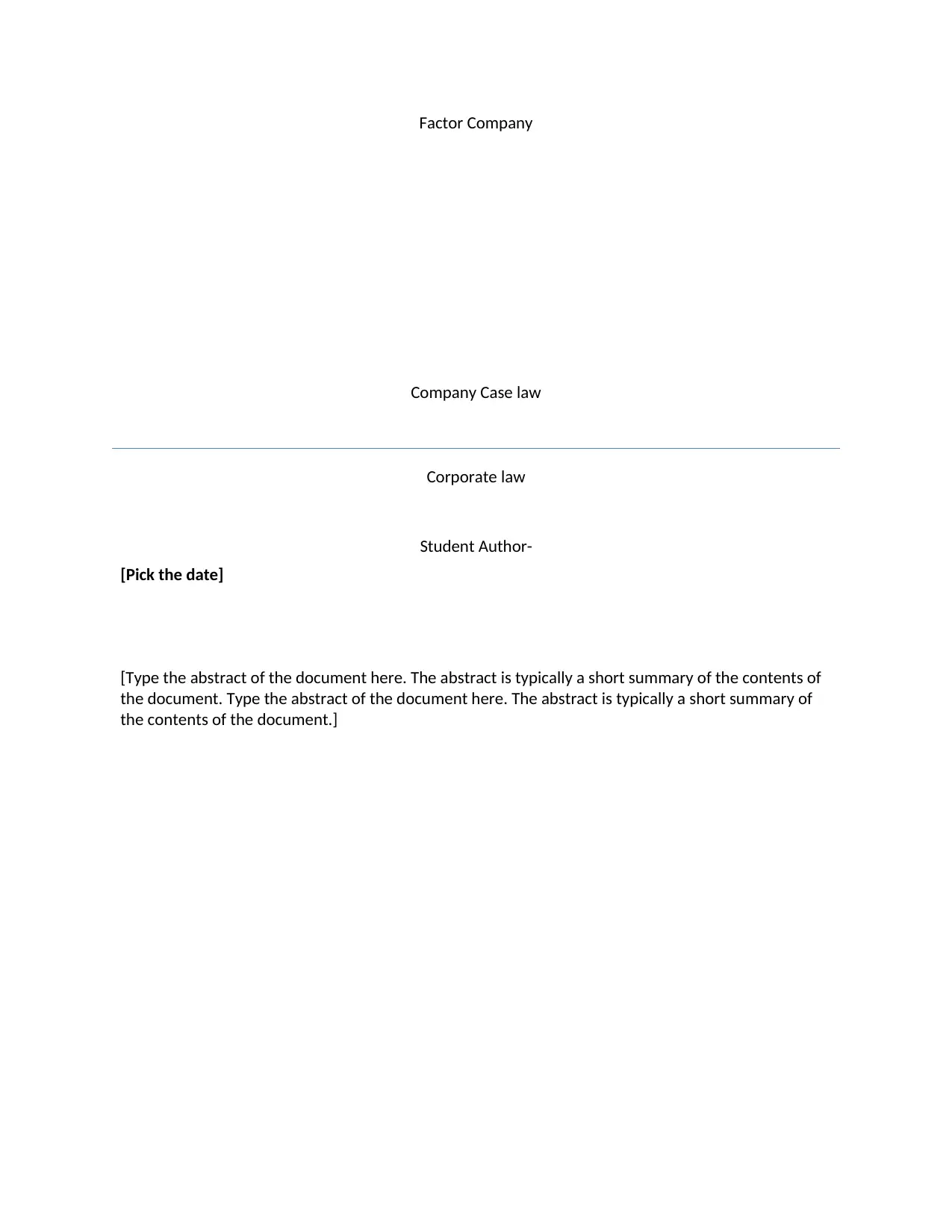
Factor Company
Company Case law
Corporate law
Student Author-
[Pick the date]
[Type the abstract of the document here. The abstract is typically a short summary of the contents of
the document. Type the abstract of the document here. The abstract is typically a short summary of
the contents of the document.]
Company Case law
Corporate law
Student Author-
[Pick the date]
[Type the abstract of the document here. The abstract is typically a short summary of the contents of
the document. Type the abstract of the document here. The abstract is typically a short summary of
the contents of the document.]
Paraphrase This Document
Need a fresh take? Get an instant paraphrase of this document with our AI Paraphraser
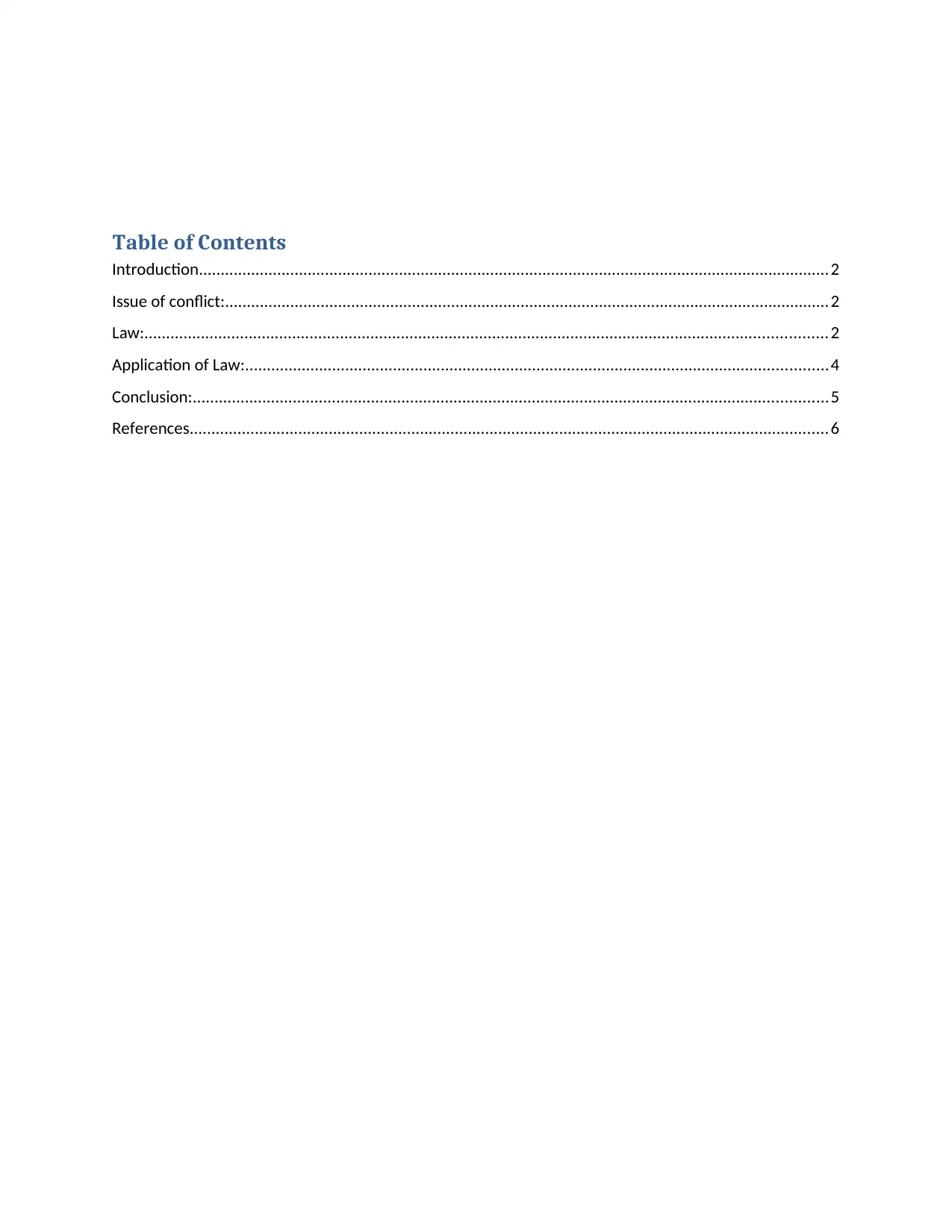
Table of Contents
Introduction.................................................................................................................................................2
Issue of conflict:...........................................................................................................................................2
Law:.............................................................................................................................................................2
Application of Law:......................................................................................................................................4
Conclusion:..................................................................................................................................................5
References...................................................................................................................................................6
Introduction.................................................................................................................................................2
Issue of conflict:...........................................................................................................................................2
Law:.............................................................................................................................................................2
Application of Law:......................................................................................................................................4
Conclusion:..................................................................................................................................................5
References...................................................................................................................................................6
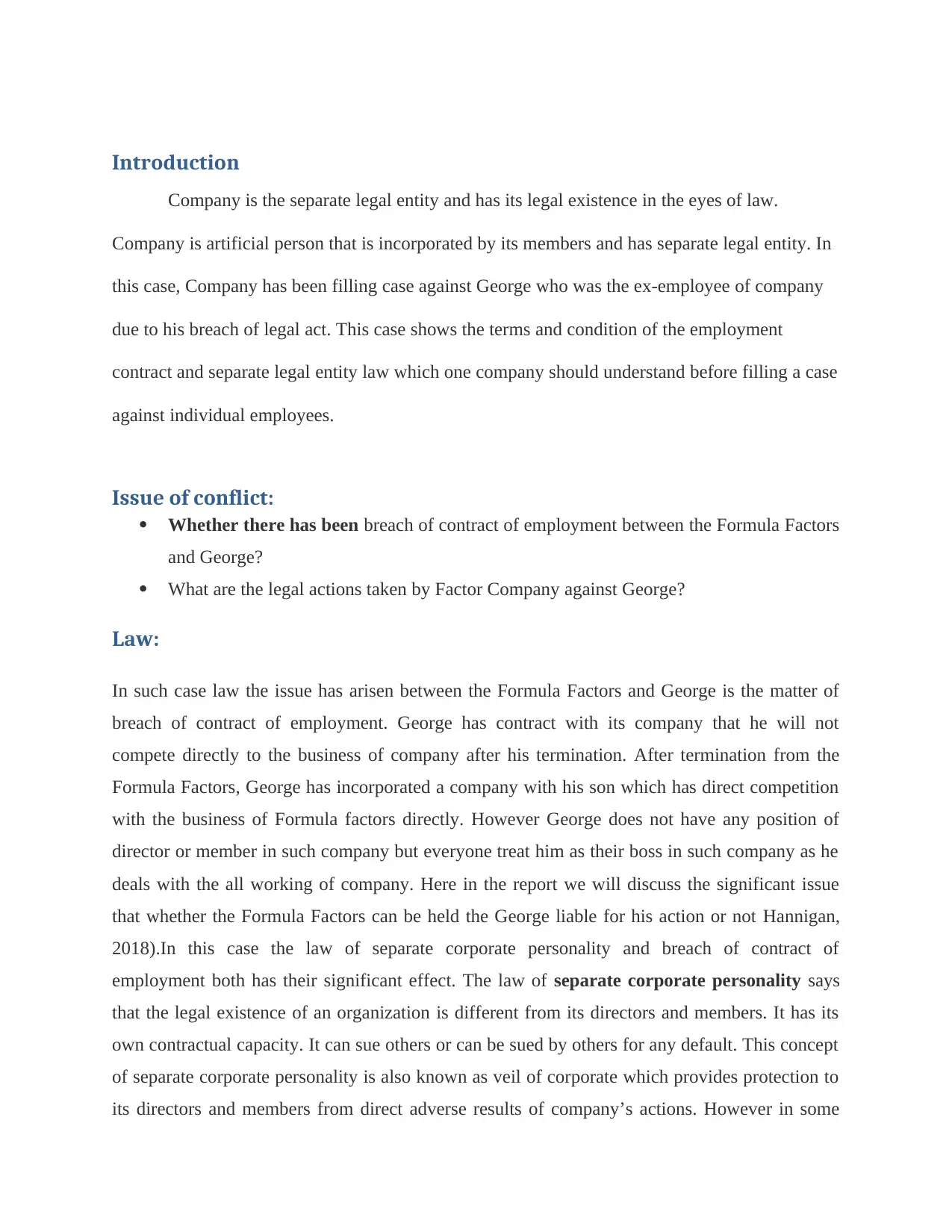
Introduction
Company is the separate legal entity and has its legal existence in the eyes of law.
Company is artificial person that is incorporated by its members and has separate legal entity. In
this case, Company has been filling case against George who was the ex-employee of company
due to his breach of legal act. This case shows the terms and condition of the employment
contract and separate legal entity law which one company should understand before filling a case
against individual employees.
Issue of conflict:
Whether there has been breach of contract of employment between the Formula Factors
and George?
What are the legal actions taken by Factor Company against George?
Law:
In such case law the issue has arisen between the Formula Factors and George is the matter of
breach of contract of employment. George has contract with its company that he will not
compete directly to the business of company after his termination. After termination from the
Formula Factors, George has incorporated a company with his son which has direct competition
with the business of Formula factors directly. However George does not have any position of
director or member in such company but everyone treat him as their boss in such company as he
deals with the all working of company. Here in the report we will discuss the significant issue
that whether the Formula Factors can be held the George liable for his action or not Hannigan,
2018).In this case the law of separate corporate personality and breach of contract of
employment both has their significant effect. The law of separate corporate personality says
that the legal existence of an organization is different from its directors and members. It has its
own contractual capacity. It can sue others or can be sued by others for any default. This concept
of separate corporate personality is also known as veil of corporate which provides protection to
its directors and members from direct adverse results of company’s actions. However in some
Company is the separate legal entity and has its legal existence in the eyes of law.
Company is artificial person that is incorporated by its members and has separate legal entity. In
this case, Company has been filling case against George who was the ex-employee of company
due to his breach of legal act. This case shows the terms and condition of the employment
contract and separate legal entity law which one company should understand before filling a case
against individual employees.
Issue of conflict:
Whether there has been breach of contract of employment between the Formula Factors
and George?
What are the legal actions taken by Factor Company against George?
Law:
In such case law the issue has arisen between the Formula Factors and George is the matter of
breach of contract of employment. George has contract with its company that he will not
compete directly to the business of company after his termination. After termination from the
Formula Factors, George has incorporated a company with his son which has direct competition
with the business of Formula factors directly. However George does not have any position of
director or member in such company but everyone treat him as their boss in such company as he
deals with the all working of company. Here in the report we will discuss the significant issue
that whether the Formula Factors can be held the George liable for his action or not Hannigan,
2018).In this case the law of separate corporate personality and breach of contract of
employment both has their significant effect. The law of separate corporate personality says
that the legal existence of an organization is different from its directors and members. It has its
own contractual capacity. It can sue others or can be sued by others for any default. This concept
of separate corporate personality is also known as veil of corporate which provides protection to
its directors and members from direct adverse results of company’s actions. However in some
⊘ This is a preview!⊘
Do you want full access?
Subscribe today to unlock all pages.

Trusted by 1+ million students worldwide
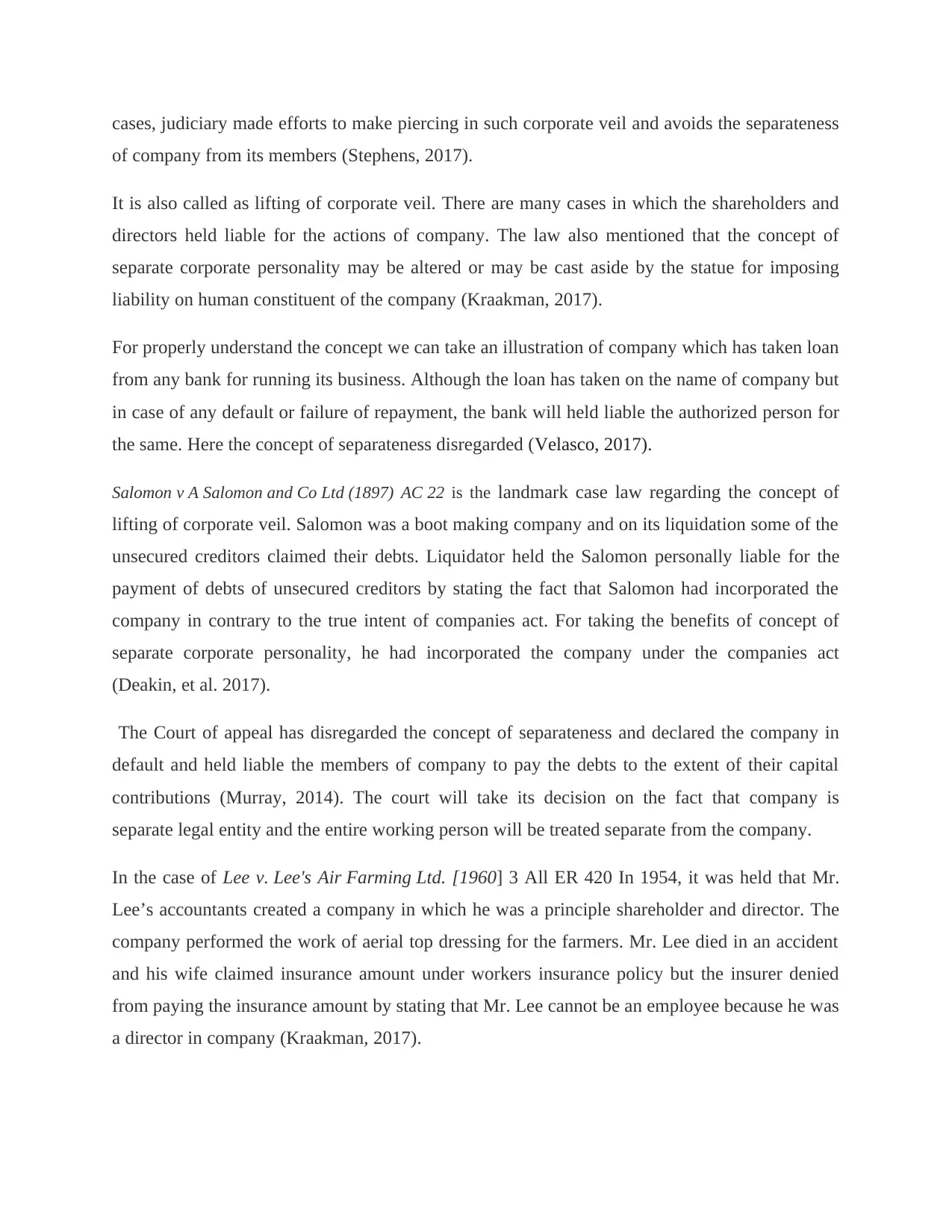
cases, judiciary made efforts to make piercing in such corporate veil and avoids the separateness
of company from its members (Stephens, 2017).
It is also called as lifting of corporate veil. There are many cases in which the shareholders and
directors held liable for the actions of company. The law also mentioned that the concept of
separate corporate personality may be altered or may be cast aside by the statue for imposing
liability on human constituent of the company (Kraakman, 2017).
For properly understand the concept we can take an illustration of company which has taken loan
from any bank for running its business. Although the loan has taken on the name of company but
in case of any default or failure of repayment, the bank will held liable the authorized person for
the same. Here the concept of separateness disregarded (Velasco, 2017).
Salomon v A Salomon and Co Ltd (1897) AC 22 is the landmark case law regarding the concept of
lifting of corporate veil. Salomon was a boot making company and on its liquidation some of the
unsecured creditors claimed their debts. Liquidator held the Salomon personally liable for the
payment of debts of unsecured creditors by stating the fact that Salomon had incorporated the
company in contrary to the true intent of companies act. For taking the benefits of concept of
separate corporate personality, he had incorporated the company under the companies act
(Deakin, et al. 2017).
The Court of appeal has disregarded the concept of separateness and declared the company in
default and held liable the members of company to pay the debts to the extent of their capital
contributions (Murray, 2014). The court will take its decision on the fact that company is
separate legal entity and the entire working person will be treated separate from the company.
In the case of Lee v. Lee's Air Farming Ltd. [1960] 3 All ER 420 In 1954, it was held that Mr.
Lee’s accountants created a company in which he was a principle shareholder and director. The
company performed the work of aerial top dressing for the farmers. Mr. Lee died in an accident
and his wife claimed insurance amount under workers insurance policy but the insurer denied
from paying the insurance amount by stating that Mr. Lee cannot be an employee because he was
a director in company (Kraakman, 2017).
of company from its members (Stephens, 2017).
It is also called as lifting of corporate veil. There are many cases in which the shareholders and
directors held liable for the actions of company. The law also mentioned that the concept of
separate corporate personality may be altered or may be cast aside by the statue for imposing
liability on human constituent of the company (Kraakman, 2017).
For properly understand the concept we can take an illustration of company which has taken loan
from any bank for running its business. Although the loan has taken on the name of company but
in case of any default or failure of repayment, the bank will held liable the authorized person for
the same. Here the concept of separateness disregarded (Velasco, 2017).
Salomon v A Salomon and Co Ltd (1897) AC 22 is the landmark case law regarding the concept of
lifting of corporate veil. Salomon was a boot making company and on its liquidation some of the
unsecured creditors claimed their debts. Liquidator held the Salomon personally liable for the
payment of debts of unsecured creditors by stating the fact that Salomon had incorporated the
company in contrary to the true intent of companies act. For taking the benefits of concept of
separate corporate personality, he had incorporated the company under the companies act
(Deakin, et al. 2017).
The Court of appeal has disregarded the concept of separateness and declared the company in
default and held liable the members of company to pay the debts to the extent of their capital
contributions (Murray, 2014). The court will take its decision on the fact that company is
separate legal entity and the entire working person will be treated separate from the company.
In the case of Lee v. Lee's Air Farming Ltd. [1960] 3 All ER 420 In 1954, it was held that Mr.
Lee’s accountants created a company in which he was a principle shareholder and director. The
company performed the work of aerial top dressing for the farmers. Mr. Lee died in an accident
and his wife claimed insurance amount under workers insurance policy but the insurer denied
from paying the insurance amount by stating that Mr. Lee cannot be an employee because he was
a director in company (Kraakman, 2017).
Paraphrase This Document
Need a fresh take? Get an instant paraphrase of this document with our AI Paraphraser
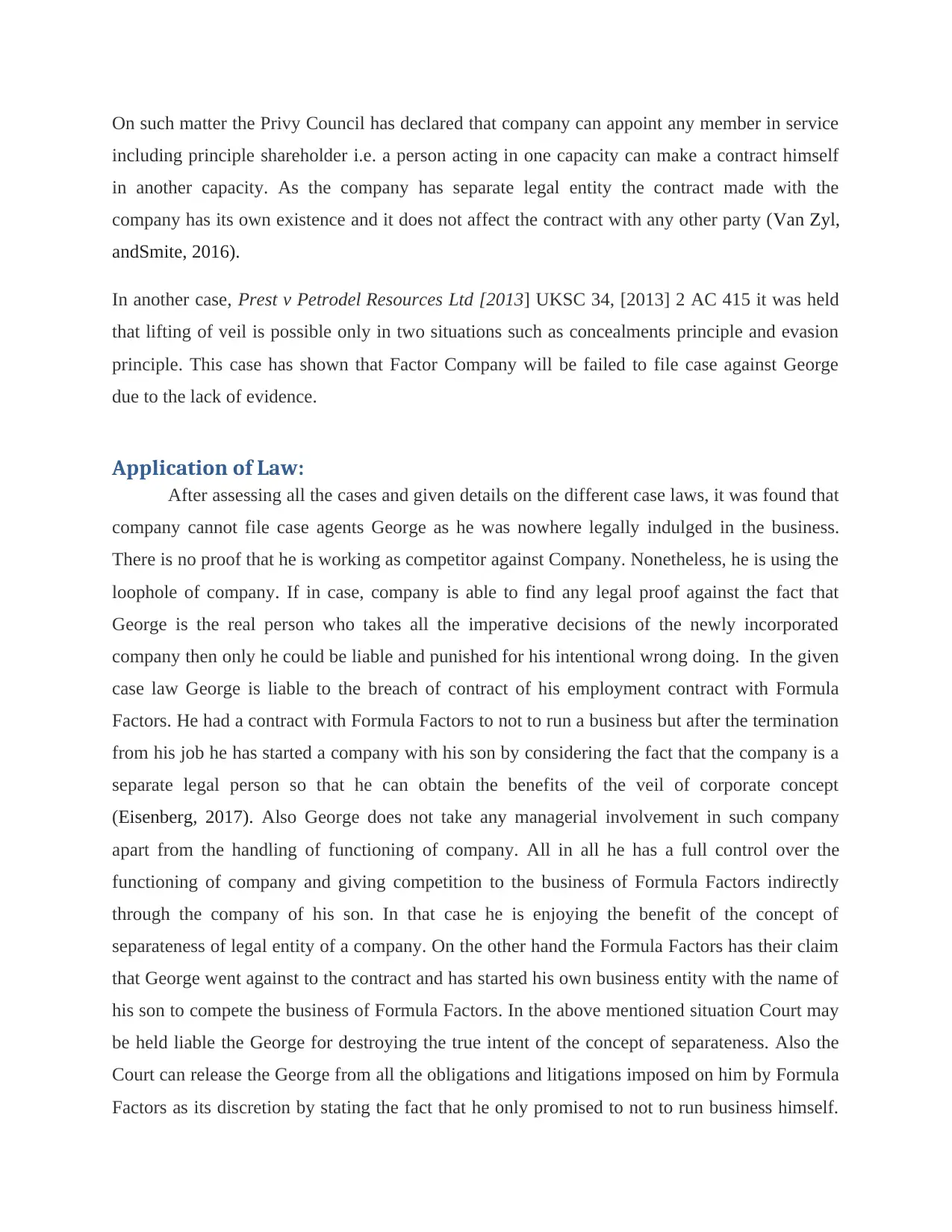
On such matter the Privy Council has declared that company can appoint any member in service
including principle shareholder i.e. a person acting in one capacity can make a contract himself
in another capacity. As the company has separate legal entity the contract made with the
company has its own existence and it does not affect the contract with any other party (Van Zyl,
andSmite, 2016).
In another case, Prest v Petrodel Resources Ltd [2013] UKSC 34, [2013] 2 AC 415 it was held
that lifting of veil is possible only in two situations such as concealments principle and evasion
principle. This case has shown that Factor Company will be failed to file case against George
due to the lack of evidence.
Application of Law:
After assessing all the cases and given details on the different case laws, it was found that
company cannot file case agents George as he was nowhere legally indulged in the business.
There is no proof that he is working as competitor against Company. Nonetheless, he is using the
loophole of company. If in case, company is able to find any legal proof against the fact that
George is the real person who takes all the imperative decisions of the newly incorporated
company then only he could be liable and punished for his intentional wrong doing. In the given
case law George is liable to the breach of contract of his employment contract with Formula
Factors. He had a contract with Formula Factors to not to run a business but after the termination
from his job he has started a company with his son by considering the fact that the company is a
separate legal person so that he can obtain the benefits of the veil of corporate concept
(Eisenberg, 2017). Also George does not take any managerial involvement in such company
apart from the handling of functioning of company. All in all he has a full control over the
functioning of company and giving competition to the business of Formula Factors indirectly
through the company of his son. In that case he is enjoying the benefit of the concept of
separateness of legal entity of a company. On the other hand the Formula Factors has their claim
that George went against to the contract and has started his own business entity with the name of
his son to compete the business of Formula Factors. In the above mentioned situation Court may
be held liable the George for destroying the true intent of the concept of separateness. Also the
Court can release the George from all the obligations and litigations imposed on him by Formula
Factors as its discretion by stating the fact that he only promised to not to run business himself.
including principle shareholder i.e. a person acting in one capacity can make a contract himself
in another capacity. As the company has separate legal entity the contract made with the
company has its own existence and it does not affect the contract with any other party (Van Zyl,
andSmite, 2016).
In another case, Prest v Petrodel Resources Ltd [2013] UKSC 34, [2013] 2 AC 415 it was held
that lifting of veil is possible only in two situations such as concealments principle and evasion
principle. This case has shown that Factor Company will be failed to file case against George
due to the lack of evidence.
Application of Law:
After assessing all the cases and given details on the different case laws, it was found that
company cannot file case agents George as he was nowhere legally indulged in the business.
There is no proof that he is working as competitor against Company. Nonetheless, he is using the
loophole of company. If in case, company is able to find any legal proof against the fact that
George is the real person who takes all the imperative decisions of the newly incorporated
company then only he could be liable and punished for his intentional wrong doing. In the given
case law George is liable to the breach of contract of his employment contract with Formula
Factors. He had a contract with Formula Factors to not to run a business but after the termination
from his job he has started a company with his son by considering the fact that the company is a
separate legal person so that he can obtain the benefits of the veil of corporate concept
(Eisenberg, 2017). Also George does not take any managerial involvement in such company
apart from the handling of functioning of company. All in all he has a full control over the
functioning of company and giving competition to the business of Formula Factors indirectly
through the company of his son. In that case he is enjoying the benefit of the concept of
separateness of legal entity of a company. On the other hand the Formula Factors has their claim
that George went against to the contract and has started his own business entity with the name of
his son to compete the business of Formula Factors. In the above mentioned situation Court may
be held liable the George for destroying the true intent of the concept of separateness. Also the
Court can release the George from all the obligations and litigations imposed on him by Formula
Factors as its discretion by stating the fact that he only promised to not to run business himself.
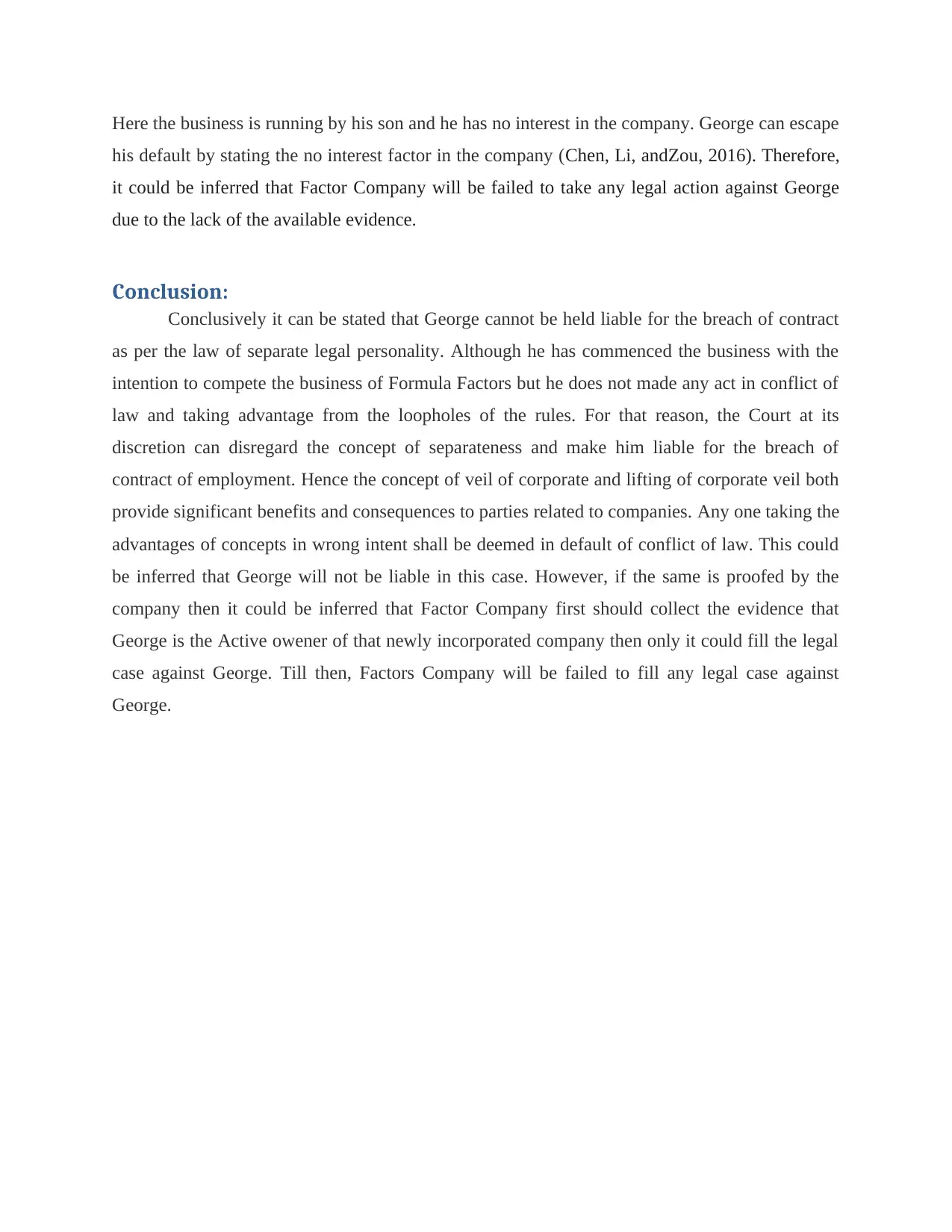
Here the business is running by his son and he has no interest in the company. George can escape
his default by stating the no interest factor in the company (Chen, Li, andZou, 2016). Therefore,
it could be inferred that Factor Company will be failed to take any legal action against George
due to the lack of the available evidence.
Conclusion:
Conclusively it can be stated that George cannot be held liable for the breach of contract
as per the law of separate legal personality. Although he has commenced the business with the
intention to compete the business of Formula Factors but he does not made any act in conflict of
law and taking advantage from the loopholes of the rules. For that reason, the Court at its
discretion can disregard the concept of separateness and make him liable for the breach of
contract of employment. Hence the concept of veil of corporate and lifting of corporate veil both
provide significant benefits and consequences to parties related to companies. Any one taking the
advantages of concepts in wrong intent shall be deemed in default of conflict of law. This could
be inferred that George will not be liable in this case. However, if the same is proofed by the
company then it could be inferred that Factor Company first should collect the evidence that
George is the Active owener of that newly incorporated company then only it could fill the legal
case against George. Till then, Factors Company will be failed to fill any legal case against
George.
his default by stating the no interest factor in the company (Chen, Li, andZou, 2016). Therefore,
it could be inferred that Factor Company will be failed to take any legal action against George
due to the lack of the available evidence.
Conclusion:
Conclusively it can be stated that George cannot be held liable for the breach of contract
as per the law of separate legal personality. Although he has commenced the business with the
intention to compete the business of Formula Factors but he does not made any act in conflict of
law and taking advantage from the loopholes of the rules. For that reason, the Court at its
discretion can disregard the concept of separateness and make him liable for the breach of
contract of employment. Hence the concept of veil of corporate and lifting of corporate veil both
provide significant benefits and consequences to parties related to companies. Any one taking the
advantages of concepts in wrong intent shall be deemed in default of conflict of law. This could
be inferred that George will not be liable in this case. However, if the same is proofed by the
company then it could be inferred that Factor Company first should collect the evidence that
George is the Active owener of that newly incorporated company then only it could fill the legal
case against George. Till then, Factors Company will be failed to fill any legal case against
George.
⊘ This is a preview!⊘
Do you want full access?
Subscribe today to unlock all pages.

Trusted by 1+ million students worldwide
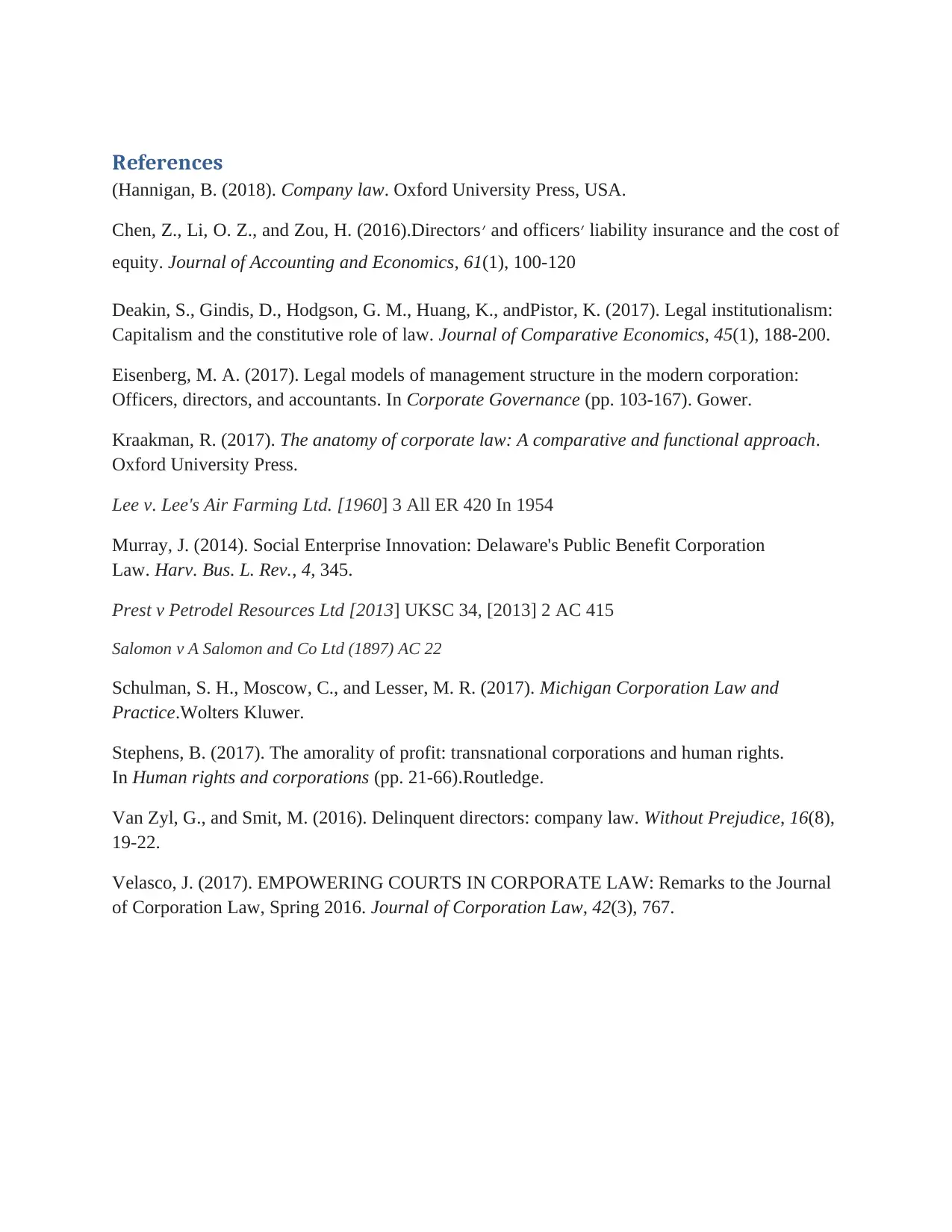
References
(Hannigan, B. (2018). Company law. Oxford University Press, USA.
Chen, Z., Li, O. Z., and Zou, H. (2016).Directors׳ and officers׳ liability insurance and the cost of
equity. Journal of Accounting and Economics, 61(1), 100-120
Deakin, S., Gindis, D., Hodgson, G. M., Huang, K., andPistor, K. (2017). Legal institutionalism:
Capitalism and the constitutive role of law. Journal of Comparative Economics, 45(1), 188-200.
Eisenberg, M. A. (2017). Legal models of management structure in the modern corporation:
Officers, directors, and accountants. In Corporate Governance (pp. 103-167). Gower.
Kraakman, R. (2017). The anatomy of corporate law: A comparative and functional approach.
Oxford University Press.
Lee v. Lee's Air Farming Ltd. [1960] 3 All ER 420 In 1954
Murray, J. (2014). Social Enterprise Innovation: Delaware's Public Benefit Corporation
Law. Harv. Bus. L. Rev., 4, 345.
Prest v Petrodel Resources Ltd [2013] UKSC 34, [2013] 2 AC 415
Salomon v A Salomon and Co Ltd (1897) AC 22
Schulman, S. H., Moscow, C., and Lesser, M. R. (2017). Michigan Corporation Law and
Practice.Wolters Kluwer.
Stephens, B. (2017). The amorality of profit: transnational corporations and human rights.
In Human rights and corporations (pp. 21-66).Routledge.
Van Zyl, G., and Smit, M. (2016). Delinquent directors: company law. Without Prejudice, 16(8),
19-22.
Velasco, J. (2017). EMPOWERING COURTS IN CORPORATE LAW: Remarks to the Journal
of Corporation Law, Spring 2016. Journal of Corporation Law, 42(3), 767.
(Hannigan, B. (2018). Company law. Oxford University Press, USA.
Chen, Z., Li, O. Z., and Zou, H. (2016).Directors׳ and officers׳ liability insurance and the cost of
equity. Journal of Accounting and Economics, 61(1), 100-120
Deakin, S., Gindis, D., Hodgson, G. M., Huang, K., andPistor, K. (2017). Legal institutionalism:
Capitalism and the constitutive role of law. Journal of Comparative Economics, 45(1), 188-200.
Eisenberg, M. A. (2017). Legal models of management structure in the modern corporation:
Officers, directors, and accountants. In Corporate Governance (pp. 103-167). Gower.
Kraakman, R. (2017). The anatomy of corporate law: A comparative and functional approach.
Oxford University Press.
Lee v. Lee's Air Farming Ltd. [1960] 3 All ER 420 In 1954
Murray, J. (2014). Social Enterprise Innovation: Delaware's Public Benefit Corporation
Law. Harv. Bus. L. Rev., 4, 345.
Prest v Petrodel Resources Ltd [2013] UKSC 34, [2013] 2 AC 415
Salomon v A Salomon and Co Ltd (1897) AC 22
Schulman, S. H., Moscow, C., and Lesser, M. R. (2017). Michigan Corporation Law and
Practice.Wolters Kluwer.
Stephens, B. (2017). The amorality of profit: transnational corporations and human rights.
In Human rights and corporations (pp. 21-66).Routledge.
Van Zyl, G., and Smit, M. (2016). Delinquent directors: company law. Without Prejudice, 16(8),
19-22.
Velasco, J. (2017). EMPOWERING COURTS IN CORPORATE LAW: Remarks to the Journal
of Corporation Law, Spring 2016. Journal of Corporation Law, 42(3), 767.
1 out of 7
Related Documents
Your All-in-One AI-Powered Toolkit for Academic Success.
+13062052269
info@desklib.com
Available 24*7 on WhatsApp / Email
![[object Object]](/_next/static/media/star-bottom.7253800d.svg)
Unlock your academic potential
Copyright © 2020–2026 A2Z Services. All Rights Reserved. Developed and managed by ZUCOL.





